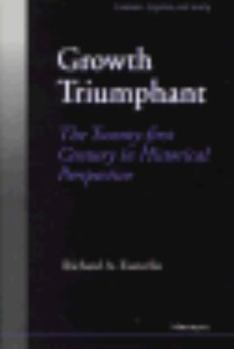Growth Triumphant: The Twenty-First Century in Historical Perspective
Select Format
Select Condition 
Book Overview
Taking a longer view than most literature on economic development, Richard A. Easterlin stresses the enormous contrast between the collective experience of the last half century in both developed and... This description may be from another edition of this product.
Format:Hardcover
Language:English
ISBN:0472106945
ISBN13:9780472106943
Release Date:January 1996
Publisher:University of Michigan Press
Length:200 Pages
Weight:1.19 lbs.
Dimensions:1.0" x 6.3" x 9.3"
Related Subjects
Business Business & Finance Business & Investing Business Development Development & Growth Earth Sciences Economic History Economic Theory Economics Environmental Economics Environmental Science Environmental Studies History Management & Leadership Politics & Social Sciences Popular Economics Production & Operations Science Science & Math Science & Scientists Science & Technology Social Sciences Sociology TheoryCustomer Reviews
1 rating
Good overview of modern global economic development
Published by Thriftbooks.com User , 26 years ago
The sweep of human history and it's follow-through to the mid-21st Century are the subject of this remarkably short (154 pages excluding reference material) yet lucid volume. Easterlin abstracts the major trends in economic history, focussing on "the epoch of modern economic growth" and it's relationship with human population dynamics. Analyzing these trends into a series of interrelated technological, organizational, and behavioral factors, he constructs a framework for projecting his view of the human condition over the next 50 years: "The future, then, to which the epoch of modern economic growth is leading is one of never ending economic growth, a world in which ever growing abundance is matched by ever rising aspirations, a world in which cultural differences are leveled in the constant race to achieve the good life of material plenty" (p. 153). Lest critics be too hasty to reject this as so much cheerleading for a conventional Western world view, let them note that the author also questions whether this future will increase human happiness - he concludes that "in the end, the triumph of economic growth is not a triumph of humanity over material wants; rather, it is a triumph of material wants over humanity." (p. 154)The major strength of this work is that it presents a concise, non-technical understanding of economic and social development as that understanding has been gained through the work of major theorists in the field of economic demography, such as Kuznets, Solow, Rostow, and Easterlin himself. Yet these theories are not accepted uncritically: the author places each in contex and considers several alternatives, then presents comparative and historical data to resolve the theoretical questions in simple intuitive terms. In this manner he quickly covers the long-contested grounds of international relations, the growth of national economies and supporting social institutions, health and population growth, and the relationship between material progress and happiness. Drawing conclusions from the resolution of one theoretical problem with emipircal evidence, he proceeds to the next in a cumulative sequence that culminates in a compelling, logically integrated argument to support his view of the future. This sequential construction is especially apparent in his explanation of how the rise of institutions conducive to techical innovation together with the accumulation of wealth preceded the wide spread application of health technology and subsequent "mortality revoultion", which cut mortality rates in half in just over a century. Following from the decline in mortality, he examines a model of decisions regarding family size and shows how the "fertility transition" follows as a logical consequence of the mortality revolution. He makes a solid case to support the expectation of continued economic growth with slowing population growth, and in the process introduces the reader to the major ac






